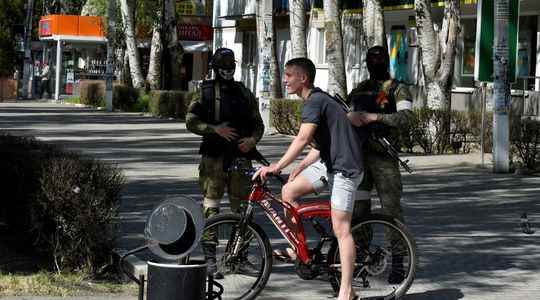“Overall, the mood is that of any provincial town in southern Russia, added to the local colors and circumstances. In short, it’s almost Russian.” In a prose mixing sweetness and conviction, a journalist from the Moscow weekly “Expert” thus describes daily life in the town of Melitopol, located in the Zaporizhia region, partially occupied by Russian forces. As a prelude to a rosy future, the article describes how, little by little, checkpoints are being blown up, administrations are reopening, road traffic is resuming and, with it, the lives of thousands of Ukrainians on the way to becoming citizens of the Greater Russian Federation.
Some already are, since a simplified procedure, introduced at the end of May, allows Ukrainians from the Zaporijia and Kherson regions, but also nationals from the separatist territories of Luhansk and Donetsk, to quickly receive Russian passports. “This simplified system will allow everyone to clearly understand that Russia is not here for a long time, but forever”, welcomed, in the wake of this announcement, one of the new leaders of the region. of Kherson appointed by Moscow.
This is a capital point in the process of Russification of the occupied territories: the appointment, to key posts in politics and administration, of men affiliated with Moscow. It doesn’t matter if they are Ukrainians or Russians, as long as they share the Kremlin’s vision. Thus, the new governor of the Kherson region, controlled by Russian forces since the first days of the war, is the former mayor of the city. Stripped of his mandate in 2012 and faced with legal disputes, Volodymyr Saldo espoused the Russian cause, to avoid prison and return to business. As for the current legitimate mayor of Kherson, Ihor Kulekaev, he has been missing since being arrested by Russian forces for having “damaged the denazification process”.
Organize services and calm the spirits
The new administrations must be in command, because the project wanted by Moscow is colossal. The leitmotif of the occupation regime is clear, all components of society must switch to Russian time: the transport system, the telephone network, information sources and even the banking sector. Thus, since July 1, a bus network has linked the city of Simferopol, in Crimea, to Melitopol and Berdiansk, cities occupied by the Russians in the Zaporijia region. The occupation administration of Kherson also announced the commissioning of a railway line linking the town of Djankoy, still in Crimea, to Kherson and Melitopol. These public policies aim to territorially attach Crimea, annexed in 2014, to the newly conquered southern and eastern regions, so that the whole forms, de facto, part of Russia.
The connections must also be mental. And for this purpose, transmission unit specialists have connected transmitters to Russian television channels, including those of the public group VGTRK, known to be the voice of the Kremlin. “De-Ukrainization” is advancing at a rapid pace: the civil status service already registers marriages and deaths according to Russian standards, children born in the region after February 24 are of Russian nationality and, at the start of the school year, school programs will have been upset. A takeover at full speed, confirming the idea that “the Russians are obsessed with control”, according to a formula by political scientist Tatiana Kastoueva-Jean at Worldin, 2018.
In order to attach, if not the adhesion, at least the good resignation of the inhabitants of the occupied zones, the Russian local administrations seek to present themselves as protectors. They have, for example, set up offices of the Pension Fund of the Russian Federation, the organization in charge of paying pensions, in the towns. Russian banking establishments are also flourishing, all belonging to the same house, Promsvyazbank, an establishment known for financing the defense sector. In this logic, the ruble gradually supplants the Ukrainian Hryvnia, until the latter disappears from the financial circuit.
Create a new geopolitical deal
But reorganizing economic life to fully integrate the populations into the Russian nation is not the only goal of Vladimir Putin: it is also a question of making significant profits. By linking the conquered areas to Crimea, he created a new lucrative commercial network, an essential point of his “New Russia” project. From now on, industries under Russian domination must export their production to Russia and Belarus, a new rule that the master of the Kremlin clarified in person: “The easiest, the cheapest would be exports via the territory of Belarus , from there you can go to the ports of the Baltic, and then to any place in the world”. By blocking the ports of the Black Sea, from where ships loaded with grain usually depart, Putin is creating a new geopolitical deal, since the countries acquiring Ukrainian grain must now turn to Russia to trade. This is enough to encourage certain states dependent on these deliveries not to adopt sanctions against Moscow. As proof, a ship loaded with 7,000 tonnes of cereals protected by the Russian navy left the port of Berdiansk on Thursday, June 30 to deliver “countries friendly to Russia”, according to the term used by the head of the pro-Russian administration of the region, Yevgeny Balitsky.
From the management of daily life in the conquered cities to the geostrategic organization of the regions under control, Russia is already drawing up, while the war continues, the main lines of a long-term policy. What to wonder if the promise made of a referendum in the occupied territories turns out to be very useful. Because, as the new governor of Kherson says: “They already belong to the big family of Russia”.
